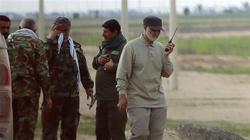 US Defense Secretary Mark Esper denied the claim by President Donald Trump that Islamic Revolution Guards Corps (IRGC) Qods Force Commander Lieutenant General Qassem Soleimani was planning “imminent” attacks on US missions abroad.
US Defense Secretary Mark Esper denied the claim by President Donald Trump that Islamic Revolution Guards Corps (IRGC) Qods Force Commander Lieutenant General Qassem Soleimani was planning “imminent” attacks on US missions abroad. RNA - Esper revealed in a Sunday interview with ‘Face the Nation’ on CBS that he “didn’t see” specific evidence that supported the American president’s claim that General Soleimani was planning attacks on four US embassies, which Trump touted in a Friday interview with Fox News.
Asked if there was any specific evidence, Esper then replied, “I didn’t see one with regard to four embassies. What I’m saying is I shared the president’s view that probably, my expectation is they were going to go after our embassies.”
Esper later told CNN’s Jake Tapper that the US president never claimed to have “specific evidence” of the imminent attacks he has warned Americans about.
Secretary of State Mike Pompeo also recently failed to provide any concrete evidence about the potential danger of General Soleimani when he spoke to the press.
Pompeo insisted Trump was given “multiple pieces of information” in regard to “imminent” dangers against the US, but he failed to detail what that information was.
Despite struggling to explain the “imminence” of the situation, Pompeo insisted that “we got it right” with the assassination. He also insisted that, “If you’re looking for imminence, you needn’t look no further than the days that lead up to the strike”.
The administration’s shaky reasoning for General Soleimani’s assassination has earned them plenty of heat. Democrats announced on Wednesday that the Trump administration failed to present evidence supporting the claim that General Soleimani was planning an imminent attack. On Thursday, the US House of Representatives voted in favor of a bill restricting Trump’s ability to wage war on Iran.
According to Fars News Agency, General Soleimani was martyred in a targeted assassination attack by US aircraft at Baghdad International Airport last Friday. Pentagon also martyred Abu Mahdi al-Muhandis, deputy commander of Iraq's Popular Mobilization Forces (PMF), or Hashad al-Shabi, five Iranian, and five Iraqi militaries.
The strike brought the United States and Iran to the brink of war, with Tehran retaliating by launching missiles at military bases in Iraq housing American troops. On Wednesday, Iran fired more than a dozen missiles at two American military bases in Iraq in retaliation for Washington's assassination of Tehran's elite commander, warning of further strikes against the Unted States.
Iranian officials branded the airstrike an “act of international terrorism” and promised retaliation. Iran has time and again warned that it will not be the initiator of any war, but reserves the right to self defense and will give a crushing response to any act of aggression by the United States.
847/940